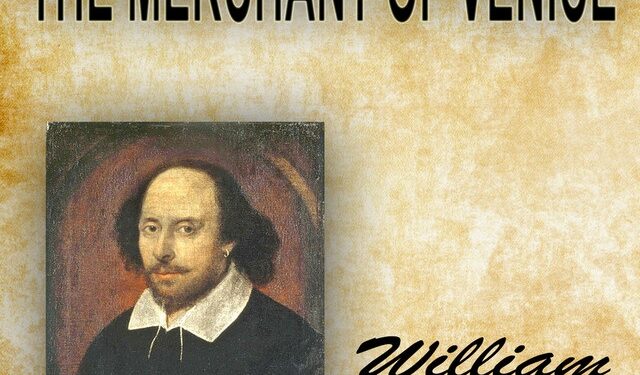Reviewer: Mubiru George
“The Merchant of Venice” is a play written by William Shakespeare, believed to have been composed between 1596 and 1598. It is categorized as a comedy, although it addresses serious themes such as prejudice, justice, and mercy. The play is set in Venice, Italy, during the 16th century.
The main plot revolves around a merchant named Antonio, who borrows money from a Jewish moneylender named Shylock in order to assist his friend Bassanio. Bassanio wishes to woo and marry Portia, a wealthy heiress. However, Antonio’s business ventures have tied up his funds, so he needs a loan. Shylock agrees to lend him the money but insists that if Antonio defaults on the repayment, Shylock will be entitled to a pound of Antonio’s flesh.
Meanwhile, Portia’s storyline is introduced, involving a test of her suitors’ worthiness to marry her. Suitors must choose between three caskets, one of which contains a portrait of Portia. Bassanio, aided by his friend Gratiano, chooses correctly and wins Portia’s hand in marriage. They marry in a joyous ceremony.
The main conflict arises when Antonio’s ships are reported lost at sea, leaving him unable to repay his debt to Shylock. Shylock seeks revenge and demands the fulfillment of the bond, leading to a trial. Portia disguises herself as a male lawyer named Balthazar and enters the courtroom to defend Antonio.
Portia uses her legal expertise to find a loophole in the bond, arguing that Shylock’s demand for a pound of flesh without shedding any blood is an impossible request. She further exposes Shylock’s malicious intent by stating that if he spills even a drop of Antonio’s blood, his own life and property will be forfeited. Shylock is defeated, and Antonio is saved. Shylock is forced to convert to Christianity and surrender much of his wealth.
The play also explores the theme of love and mercy through the character of Shylock’s daughter, Jessica, who elopes with Lorenzo, a Christian friend of Bassanio. Their relationship challenges societal and religious boundaries.
“The Merchant of Venice” delves into complex issues of discrimination, tolerance, and the power dynamics between different groups. It raises questions about justice, mercy, and the consequences of seeking revenge. The play remains relevant today, as it continues to provoke discussions about anti-Semitism, prejudice, and the human capacity for forgiveness.
The Merchant of Venice’s Literary Devices:
“The Merchant of Venice” by William Shakespeare is a play that employs various literary devices to enhance its themes, characters, and overall dramatic effect. Here are some of the prominent literary devices used in the play:
Dramatic Irony: The audience is aware of information that the characters are not, creating tension and suspense. For example, when Portia disguises herself as a male lawyer, the audience knows her true identity while the characters remain unaware.
Foreshadowing: The use of hints or clues about future events. In “The Merchant of Venice,” the character of Shylock frequently mentions his desire for revenge, foreshadowing the trial scene and its outcome.
Metaphor: A figure of speech that makes a comparison between two unlike things. For instance, when Antonio describes his sadness as a “deep and bottomless pit,” it conveys the depth of his despair.
Simile: A figure of speech that compares two things using “like” or “as.” In the play, Portia compares mercy to the “gentle rain from heaven” in her famous speech on mercy.
Soliloquy: A dramatic device where a character speaks their thoughts aloud, revealing their innermost feelings and intentions. Shylock’s famous soliloquy in Act III, Scene 1, reflects his anguish and desire for revenge.
Pun: A play on words that exploits multiple meanings or similar sounds. The character of Portia makes frequent use of puns, such as when she says, “I’ll make fast the doors and gild myself with some more ducats” (Act III, Scene 2), using “gild” to mean both “cover with gold” and “deceive.”
Allusion: A reference to a well-known person, event, or work of literature. Shakespeare incorporates allusions to biblical stories, such as the story of Jacob and Laban, to enrich the play’s thematic depth.
Imagery: The use of descriptive language to create vivid mental pictures. Shakespeare’s rich imagery brings the setting and characters to life, such as when Portia describes mercy as “an attribute to God himself” (Act IV, Scene 1).
Irony: A literary technique that involves a contrast between expectation and reality. The play contains situational irony, such as when Shylock seeks justice but is denied it by a legal technicality.
Dramatic Monologue: A lengthy speech by a single character addressing other characters or the audience. Portia’s famous speech on the quality of mercy (Act IV, Scene 1) is a notable example of a dramatic monologue in the play.
These are just a few of the many literary devices Shakespeare employs in “The Merchant of Venice.” They contribute to the play’s complexity, depth, and enduring appeal.
Mubiru George is a senior teacher based in Jinja, Eastern Uganda.
Tel: 0754877595
Email: georgemubiru93@gmail.com
Do you have a story in your community or an opinion to share with us: Email us at editorial@watchdoguganda.com














